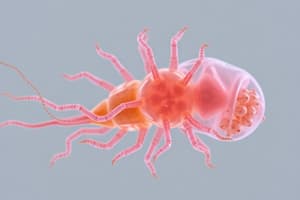Podcast
Questions and Answers
What classification does Toxoplasma gondii belong to?
What classification does Toxoplasma gondii belong to?
- Protozoa (correct)
- Viruses
- Fungi
- Bacteria
Which phylum does Toxoplasma gondii belong to?
Which phylum does Toxoplasma gondii belong to?
- Apicomplexa (correct)
- Nematoda
- Ascomycota
- Chlorophyta
What is the class of Toxoplasma gondii?
What is the class of Toxoplasma gondii?
Sporozoasida
What subclasses does Toxoplasma gondii belong to?
What subclasses does Toxoplasma gondii belong to?
The stages infective to the feline host in meat are _____ and _____.
The stages infective to the feline host in meat are _____ and _____.
What is a schizont?
What is a schizont?
What is schizogony?
What is schizogony?
What is a merozoite?
What is a merozoite?
What is gametogony?
What is gametogony?
What are microgametes?
What are microgametes?
What is sporogony?
What is sporogony?
What is an oocyst?
What is an oocyst?
What is a sporozoite?
What is a sporozoite?
What disease is caused by Toxoplasma gondii?
What disease is caused by Toxoplasma gondii?
How do humans become infected with Toxoplasma gondii?
How do humans become infected with Toxoplasma gondii?
What is the primary method of diagnosing Toxoplasmosis?
What is the primary method of diagnosing Toxoplasmosis?
What organism is Toxoplasma gondii transmitted by?
What organism is Toxoplasma gondii transmitted by?
What is the epidemiology of Toxoplasma gondii?
What is the epidemiology of Toxoplasma gondii?
Flashcards are hidden until you start studying
Study Notes
Toxoplasma gondii Overview
- Classification: A protozoan parasite.
- Phylum: Belongs to Apicomplexa, characterized by an apical complex structure.
Life Cycle and Stages
- Class: Sporozoasida, undergoes both asexual and sexual reproduction involving oocysts with sporozoites; movement achieved by flexion or gliding.
- Subclass: Coccidiasina (coccidia) with a life cycle comprising schizogony, gametogony, and sporogony, primarily in vertebrates.
- Infective stages in feline hosts:
- Bradyzoites: Found in zooitocysts of non-feline tissues, slow-growing.
- Tachyzoites: Merozoite stage rapidly released from macrophages in non-felines.
Reproductive Phases
- Enteric phases in cats include various stages: schizont and merozoite, leading to gametogony forming microgametes and oocysts through sporogony.
- Schizont: A multinucleated cell participating in schizogony.
- Schizogony: Rapid asexual reproduction involving nuclear division followed by cytoplasmic division.
- Merozoite: Daughter cells produced by schizogony.
- Gametogony: Formation of gametes (microgametes fertilize macrogametes).
- Sporogony: Division of zygotes into sporozoites.
- Oocyst: Rounded cyst containing sporozoites, excreted in feces.
Infection and Transmission
- Toxoplasmosis: Disease caused by Toxoplasma gondii, first identified in 1908. Primarily contracted through ingestion of uncooked meat or contact with cat feces.
- Lifecycle:
- Primary hosts: Mammals from the Felidae family (cats).
- Oocysts are shed in feces for a short duration yet in large quantities, taking 1-5 days to sporulate and become infective.
- Intermediate hosts (e.g., birds, rodents) contract the infection via contaminated food or water, with oocysts transforming into tachyzoites.
- Cats become infected by consuming intermediate hosts or sporulated oocysts directly.
Human Infection Routes
- Through consumption of undercooked meat containing tissue cysts.
- Exposure to contaminated food or water, soil, or cat feces.
- Additionally, transmission may occur via blood transfusions, organ transplants, or vertically from mother to fetus.
Tissue Cysts Formation
- Toxoplasma gondii forms zooitocysts in human hosts, residing in:
- Skeletal muscle
- Myocardium
- Brain
- Eyes
- Zooitocysts can persist throughout the host's life.
Diagnosis
- Typically involves serological methods for antibody detection.
- Alternatively, tissue pseudocysts can be identified via stained biopsy specimens.
- Diagnosis of congenital infections is performed through detecting T. gondii DNA in amniotic fluid using PCR.
- Other diagnostics include ELISA for antibodies and molecular techniques for identifying presence of Toxoplasma genes.
Epidemiology
- Toxoplasma gondii has a global distribution and can be transmitted via various methods, including direct fecal contamination and undercooked meat ingestion.
- All mammals, including humans, can transmit toxoplasmosis transplacentally.
Studying That Suits You
Use AI to generate personalized quizzes and flashcards to suit your learning preferences.




